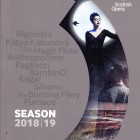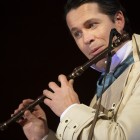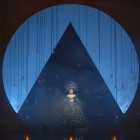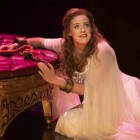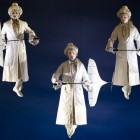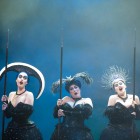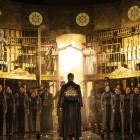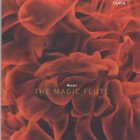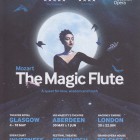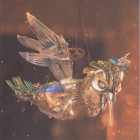Zauberflöte 2019Scottish Opera
Read more about the opera Magic Flute
This staging, the third production for Scottish Opera by Sir Thomas Allen, was a great success on its first appearance. As a baritone he sang in the opera frequently throughout his career, for many years as Papageno, more recently as the Speaker. He has a detailed knowledge of the piece from the inside, and, having worked in a wide range of production styles himself, came up with a fresh concept. We attended the fourth performance - a packed Sunday matinee with many operatic novices in the hugely enthusiastic audience.
The setting is mid-Victorian, and is much assisted by Simon Higlett's superbly atmospheric designs. The first impressions are of theatre and music hall. Later the Industrial Revolution becomes a dominant influence in Sarastro's domain - the priests are dressed in overalls with hard hats, and the massive iron structure for the trials by fire and water could have been designed by Isambard Kingdom Brunel or Sir Joseph Bazalgette - though later science fiction by H G Wells and Jules Verne might also apply.
Conductor Tobias Ringborg has worked regularly with the company in recent seasons, displaying an equally sure touch with middle-period Verdi as with Mozart. Tempi were brisk, percussive effects were punchy and there was a practised skill in co-ordinating the links between music and dialogue - a complex matter that has, in the past, killed some Flute performances stone dead. Susannah Wapshott, the chorus master, also made an impact drawing some distinctive singing from the crowded galleries - so often the choruses in the Flute can lose focus, but not here.
Of the cast, the only member returning from last time was Richard Burkhard, an excellent Papageno who quickly grabbed the affections of the audience, and held on to them with ease. Adrian Thompson has appeared here for over thirty-five years, though infrequently. He has recently sung Monostatos in David McVicar's Royal Opera production (in which Sir Thomas has been a regular as Speaker), and projected the appropriate combination of malevolence and humour. Peter Gijsbertsen made an excellent impression last autumn as Alfredo in La traviata and was well-suited to Tamino. He looks just right, tall and elegant, handles his dialogue with great skill, and phrases his music beautifully. If there is one reservation it is perhaps the slightly wiry tone quality. As the voice gains in power it is also losing in sweetness.
The rest of the cast was new and largely unknown in these parts. Julia Sitkovetsky is a Londoner who made a near-ideal Queen of the Night. The voice is big, but she had no difficulty with the notorious high notes. Even more unusual was her confidence in the phrasing of the difficult coloratura roulades that powerful sopranos usually struggle with. The new Sarastro, James Creswell, has a beautifully focussed voice with a dark tone, not at all woolly, yet without any hint of gravel. A lovely sound. The translation used, by Kit Hesketh-Harvey, was usually well-judged, but did preserve some distinctly misogynist views among the priesthood. The Speaker, Dingle Yandell, was just as distinctive as his master - perhaps as well, since he takes over for some later performances as Sarastro. He and the priests, as well as the chorus, looked remarkably distinguished in their high-Victorian rig of black frock coats and toppers.
The Pamina was another newcomer, Gemma Summerfield. She began her training in Glasgow, but this seems to be her first appearance locally since then. A beautifully poised account of her great lament, and the second act trio and run-in to the trials had a lovely clarity. Another young soprano who did well was Sofia Troncoso, a delightful Papagena. The three ladies were nicely differentiated in character. The impressive figure of Siôn Goronwy added much to the trial scene - he has sung both Sarastro and Osmin at the Perth Festival, but this seems to be his debut in the central belt. A feature of the entire performance was the wonderful clarity of diction, even from the chorus. For once the surtitles were redundant.
Scottish Opera 2018/19
Scottish Opera's 2018/19 season started off with the company's first full-scale staging of one of the most popular works of the verismo school in Leoncavallo's Pagliacci. This was seen in Paisley in July - an impressively large-scale production with many local performers, all in a huge tent erected temporarily on a sports ground - 'The Paisley Opera House' - with luck the forerunner of several such ventures. The new stagings included a world premiere, Anthropocene, an eagerly awaited further collaboration between Stuart MacRae and Louise Welsh. There was also a new staging of Kátya Kabanová. Returning to the composition period of Pagliacci, the continuing Sunday afternoon concert series included Scottish premieres for Puccini's second opera, Edgar, and Mascagni's fifth, Silvano. There were also major revivals, and long tours, for Matthew Richardson's staging of Rigoletto from 2011 and Sir Thomas Allen's of The Magic Flute (first seen in 2012).
Performance Cast
- Tamino a Prince
-
Peter Gijsbertsen (Exc May 14, 18; Jun 13, 15)
William Morgan (May 14, 18; Jun 13, 15)
- First Lady in attendance on the Queen
- Second Lady in attendance on the Queen
- Third Lady in attendance on the Queen
- Papageno a bird-catcher
-
Richard Burkhard (Exc Jun 20, 22, 27, 29)
James Cleverton (Jun 20, 22, 27, 29)
- Queen of Night
- Monostatos a servant in the Temple
- Pamina daughter of the Queen of Night
- First Boy
- Second Boy
- Third Boy
- Speaker at the Temple
-
Dingle Yandell (Exc Jun 1, 5, 20, 22, 27, 29)
Francis Church (Jun 1, 5, 20, 22, 27, 29)
- Sarastro High Priest of Isis and Osiris
-
James Creswell (Exc Jun 1, 5, 20, 22, 27, 29)
Dingle Yandell (Jun 1, 5, 20, 22, 27, 29)
- First Priest
- Second Priest
-
Dingle Yandell (Exc Jun 1, 5, 20, 22, 27, 29)
Francis Church (Jun 1, 5, 20, 22, 27, 29)
- Papagena disguised as an old woman
- First Armed Man
- Second Armed Man
Production Cast
- Conductor
-
Tobias Ringborg (Exc Jun 13, 15)
Derek Clark (Jun 13, 15)
- Director
- Designer - Sets
- Designer - Costumes
- Lighting
- Choreography
- Orchestra
- Translator
- Sponsor
Performance DatesZauberflöte 2019
Theatre Royal, Glasgow | Glasgow
4 May, 19.15 8 May, 19.15 10 May, 19.15 12 May, 15.00 14 May, 19.15 18 May, 19.15
Eden Court Theatre | Inverness
21 May, 19.15 23 May, 19.15 25 May, 19.15
His Majesty's Theatre, Aberdeen | Aberdeen
30 May, 19.15 1 Jun, 19.15
Festival Theatre, Edinburgh | Edinburgh
5 Jun, 19.15 9 Jun, 15.00 11 Jun, 19.15 13 Jun, 19.15 15 Jun, 19.15
Hackney Empire | London
20 Jun, 19.30 22 Jun, 19.30
Grand Opera House, Belfast | Belfast
27 Jun, 19.15 29 Jun, 19.15
